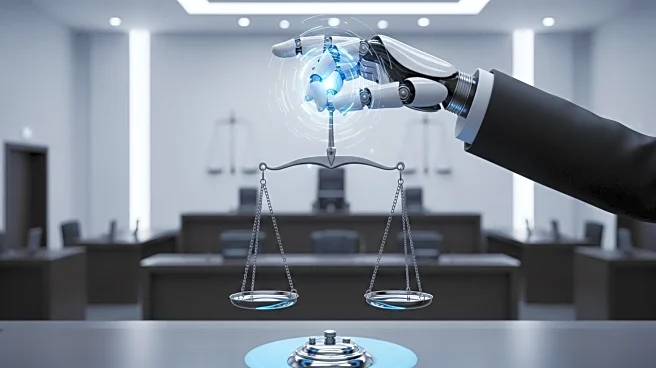What's Happening?
Lawhive, an AI-powered legal tech company, has acquired a UK-based law firm, Woodstock, which specializes in property law. This acquisition marks a significant development as it is one of the first instances of a legal tech company purchasing a law firm. Lawhive's AI assistant, Lawrence, is designed to handle tasks such as drafting documents, conducting research, and managing cases. The company operates in various practice areas, including property law, and has Google as a significant investor. Lawhive also operates in the United States, offering legal services at reduced costs compared to traditional law firms. The acquisition raises questions about transparency and the extent to which AI will replace human legal professionals in providing legal services.
Why It's Important?
The acquisition of a law firm by an AI-based legal tech company like Lawhive could significantly impact the legal industry. By utilizing AI tools to perform tasks traditionally done by lawyers, Lawhive can reduce operational costs and increase profits. This shift could lead to a reduction in the number of legal professionals needed, as AI takes over tasks such as legal analysis and document preparation. The development raises concerns about the accuracy and ethical implications of AI handling legal tasks, as well as the potential for job displacement within the legal profession. As AI technology continues to advance, the role of lawyers may evolve, with a focus on advisory and strategic services rather than routine legal tasks.
What's Next?
The acquisition by Lawhive could set a precedent for similar moves by other legal tech companies, potentially leading to a transformation in how legal services are provided. As AI tools become more sophisticated, the need for human oversight may decrease, further altering the landscape of the legal profession. Stakeholders, including legal professionals and clients, may need to adapt to these changes, with a focus on ensuring transparency and maintaining ethical standards in AI-driven legal services. The long-term implications could include a shift towards online hubs for legal services, with AI playing a central role in service delivery.
Beyond the Headlines
The acquisition highlights the ethical and legal challenges associated with AI's growing role in the legal industry. Ensuring that AI tools are accurate and reliable is crucial, as errors could have significant legal consequences. Additionally, the transparency of AI's involvement in legal services is essential for maintaining client trust. The potential reduction in legal jobs also raises societal concerns about employment and the need for reskilling in the legal profession. As AI continues to evolve, the legal industry may need to address these challenges to ensure a balanced integration of technology and human expertise.









